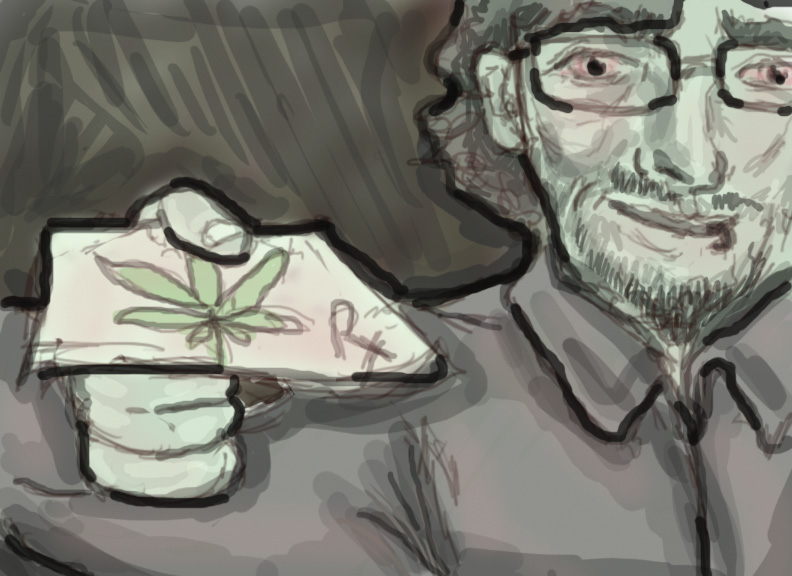It’s easy to get medical marijuana

By Thomas Standifer
Oct. 7, 2010 1:53 a.m.
A large sign jutted off the roof of the building, affixed with a neon green marijuana leaf. I had arrived.
The Westwood establishment belonged to Dr. Michael Morris, a physician who specializes in medical marijuana recommendations. I wondered if he would write one for me.
I have nothing that would qualify as a serious medical condition, but it’s common knowledge that when it comes to garnering a medical marijuana recommendation, nobody is checking. My goal was to see how easy it really was to get access to legal bud.
Anxiety seemed like a good excuse, I thought. It is something nearly every college student deals with, and I could make it sound really serious if I had to.
We had the consultation in Morris’ office. Inside the room was a weight scale, a blood pressure machine and the walls were covered with pictures of dogs and horses.
I told him I had anxiety, and it sometimes made it so I couldn’t sleep. I said it was a recurring problem I’d been dealing with for years.
“Have you ever been to a party where someone introduced themselves to you, and you immediately forgot their name?” Morris asked.
I nodded yes to the question.
He told me I have attention deficit disorder.
My heart started racing. A doctor had never diagnosed me with that before. Yet Morris reassured me that 80 percent of the people who come and see him suffer from ADD, himself included.
He verified my ADD with a few more questions.
I’m sometimes awkward at parties, mix up my rights and lefts, and I’m not the best driver.
These answers pointed Morris straight to ADD-land and I wasn’t even fibbing.
As I was debating in my head whether or not I could really have a hyperactivity problem, I found out that I also have dyslexia.
Morris gave me a passage of dense poetry to read, and I took too long to get through it. He then tried to ease my fears, adding that he, too, had the condition.
I had some serious issues, Morris said. Cannabis would help with a few, but not with all of them. Specifically, he said the drug would help with sleep and anxiety. I needed a larger cocktail of medication to deal with the complete ADD condition ““Â his recommendation were focus-inducing stimulants Adderall and Ritalin.
Morris recommended the use of medical marijuana to combat my newly discovered web of issues through a large loophole in Proposition 215. The passage is reprinted on his website, as the legal framework that allowed him to issue recommendations so broadly.
The proposition states that marijuana can be used in the treatment of serious conditions like cancer and AIDS, but also includes an open-ended clause stating it can be used for “any other illness for which marijuana provides relief.”
After finding out I really did not have anxiety or insomnia ”“ that I had made the whole story up, Morris said it was very hard to account for people who are lying.
“You have to treat every patient just like you would any other patient,” Morris said. “I can’t do a lie detector test on everybody.”
Requiring his patients show their medical records was out of the question, too. He said he is an old-fashioned doctor who is able to diagnose patients without the help of others.
Donald Tashkin, a professor emeritus at the David Geffen School of Medicine, agreed that marijuana can and should be recommended by physicians in cases of serious medical conditions where other options have been fully exhausted.
Tashkin said he felt many patients were likely misrepresenting themselves, much like I did to Morris, in order to get access to the drug for purely recreational use.
Curtis Chen, a fourth-year business economics student, said the process is flawed on both the patient’s and doctor’s end.
He said during his experience getting a marijuana card that his answers to the doctor’s questions were manipulated to fit the laws. Through leading questions the doctor got him to state that his insomnia led to a decrease in the ability to perform basic life functions, including going to work, he said.
The situation is complicated, Tashkin admitted.
He said many of the conditions in which patients would benefit from using cannabis have no cost-effective test, like chronic pain. Thus, he said, patient accounts are usually the type of information that doctors rely on.
E-mail Standifer at [email protected].


